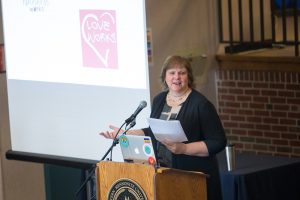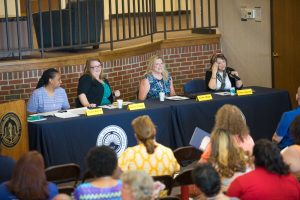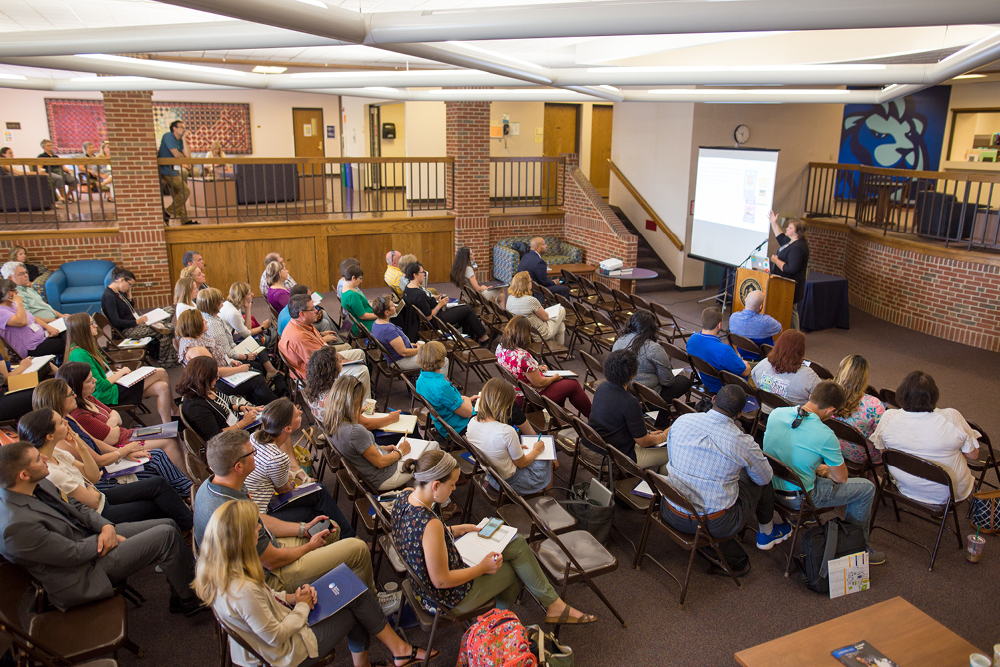The American public school system has many structural issues, from an emphasis on standardized assessments to inequitable disciplinary procedures and overcrowding, but Kathy Evans, an education professor at Eastern Mennonite University, thinks the real problems are rooted much more deeply.

And they are ones that every educator can contribute towards solving.
“Our real problems are about our shared humanity, about our sense of belonging, about our connections to one another and to the world we inhabit,” she said in a keynote address at EMU’s fourth annual Restorative Justice in Education (RJE) Conference.
But a shared ethos of restorative justice has the potential to create change in our educational system, she added.
“RJE begins and ends with the values of dignity, respect and mutual concern for one another and upholds an underlying conviction that all people, and all means all, y’all, children and youth, parents and caregivers, educators, administrators, bus drivers, cafeteria workers, and custodial staff,” Evans said. “All people are worthy, relational, and interconnected.”
Conference gathers new and experienced RJE practitioners
For the more than 100 conference participants, many of whom invested two days of their summer vacation and drove hundreds of miles, Evans’ message is one that resonates deeply.
“This opportunity really emphasizes learning about and sharing positive principles and practices in our work towards creating just and equitable learning environments,” said graduate teacher education program director Meg Sander. “In that kind of environment, everyone in the community can nurture and develop healthy relationships and transform conflict. We can all effect change.”
The annual summer event, hosted by EMU’s MA in Education programs, has always drawn participants from several states, growing in diversity as RJE practices are expanding across the country. The June 25-26 event included participants from North Carolina, Massachusetts, Delaware, New York and Virginia, representing 11 districts.
In addition to administrators, teachers, counselors and behavioral specialists working in the schools, other attendees included therapists and counselors, community service board employees, and representatives from the Office on Youth, as well as the University of Delaware.
The conference included skill- and knowledge-building sessions on tracks for novice and more experienced practitioners as well as reflective sessions in which participants could think about how learnings about RJE can be implemented or considered within current practices and cultures.
Presenters included:
- Diana Degner MA ’17 (confict transformation), circles practitioner;
- Emily Imgram GC ‘19, an ELL teacher with Harrisonburg City Schools;
- Laura Feichtinger-McGrath GC ‘18, an EL coordinator with Harrisonburg City Schools;
- Connie Honsinger, trauma informed specialist, Chesterfield County Public Schools.
- April Howard GC ‘18, executive director of psychological and student services for Harrisonburg City Schools;
- Jennifer Morris ‘91, principal, Shelburne Middle School, Staunton, Virginia;
- Sal Romero, coordinator of family and community engagement, Harrisonburg City Schools, and past member of the Virginia Board of Education; and
- Kendal Swartzentruber ‘07, MA ‘12 (education), an education coordinator at the Virginia Department of Education.
Evans: RJE can address critical, systemic issues
Among the larger themes of the event was the potentiality of RJE — how its principles and practices can empower the individual to effect ripples of systemic change.
Evans focused her keynote on how restorative justice practices can address three criticisms of the American educational system related by RJ practitioner Jasmyn Story at the recent NACRJ conference: toxic individualism, an over-reliance on hierarchies, and a de-tethering of ourselves.

Without budgeting money or hiring new personnel, these problems can be addressed anew by individuals who practice the principles of restorative justice within their own context, Evans said. “We don’t have to burn it all down and start over. Each of us in our own way can do this work to combat these problems.”
Panelists emphasize networking, collaboration
Four RJ professionals were invited for a panel session on the second morning that highlighted the “multi-tiered systems of support that can help us engage kids,” said Evans in her introduction.
“We can do all kinds of beautiful things in the classroom,” she said, “but what do we do with those behaviors that are defined as severe in this current climate? How do we handle things through a restorative lens that keeps them from being referred to the courts, and if they are referred to the courts, how can we help get them the support they need?”
Panelists brought perspectives and experiences working within different organizational structures in the criminal justice, advocacy, social services, and educational environments.
- Tashika Moore, of Wilmington, Delaware, works with several organizations, including the NAACP and the Delaware Center for Justice, to advocate for children and youth. She hosts circles, conducts trainings, and works in policy development with legislators, building upon 12 years of experience in mental and behavioral health with adjudicated adolescent youth.
- Barbie Fischer MA ‘12 (conflict transformation) is executive director of Restorative Encounters, an association of RJ practitioners and advocacy organization. She also works with the Delaware Center for Justice as the victim restoration and community mediation program coordinator.
- Vickie Shoap is a restorative justice specialist for Fairfax County Public Schools, the 11th largest school district in the country. Her team of seven serves 245 schools in a variety of capacities, from “bringing RJ practices to classrooms, to teaching about how to live in community to restorative justice itself.” Her background is in RJ diversion with the juvenile court system.
- Donna Chewning MA ‘05 (conflict transformation) facilitates restorative circles in middle schools in Roanoke, VA and mediates civil, juvenile, and domestic relations court cases in southwest Virginia.
Panelists urged conference participants to be aware of local and state legislation. Moore was an active advocate for Delaware’s SB 85, a bill that legislated monitoring and evaluation of schools with significant suspension disparities and also promotes restorative justice.
Fischer emphasized that Moore’s legislative advocacy empowered her. “Social capital, networking and community help me do my work,” she said. “We forget about this core tenet sometimes. Who do we know and who do they know and how can they help us accomplish our goals for the betterment of our community?”
Want to learn more?
The next RJE Conference will be June 23-24, 2020.
In addition to the MA in Education and MA in Restorative Justice in Education programs, EMU offers a graduate certificate in restorative justice in education with flexible study options for professionals, including summer courses, weekend courses and single-day-a-week semester options.
